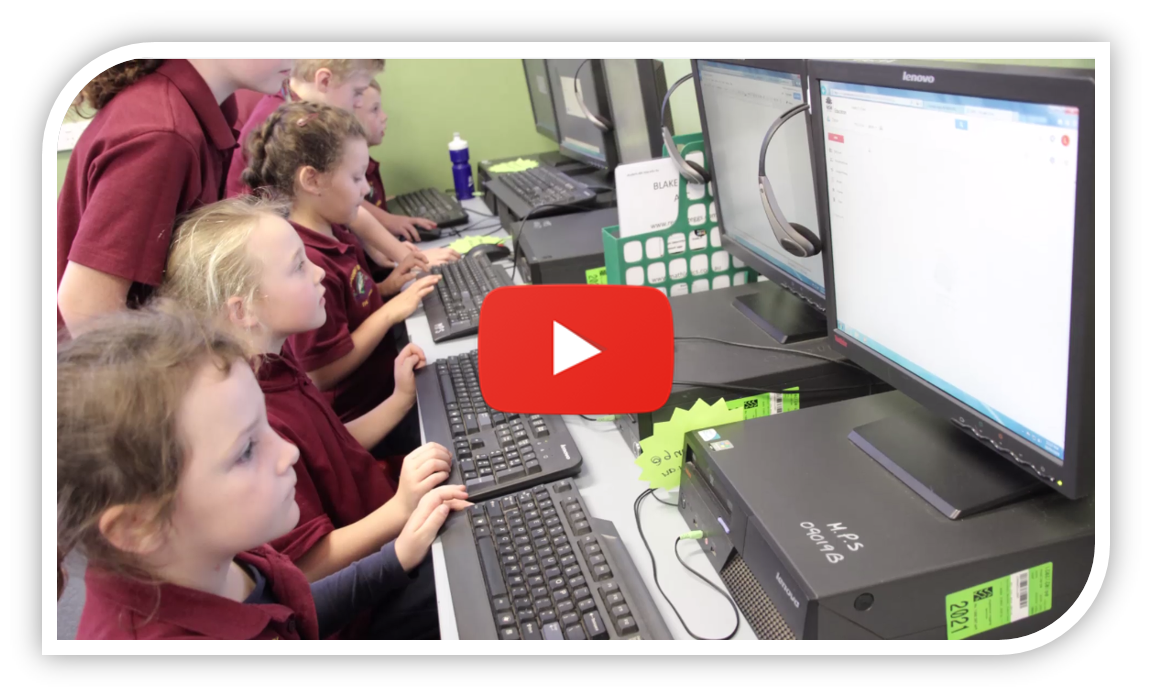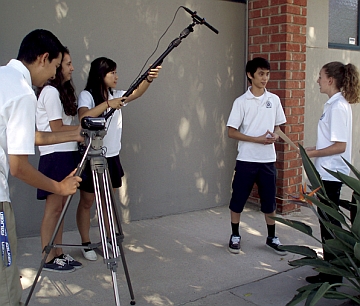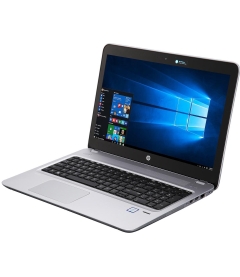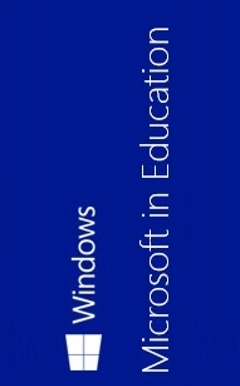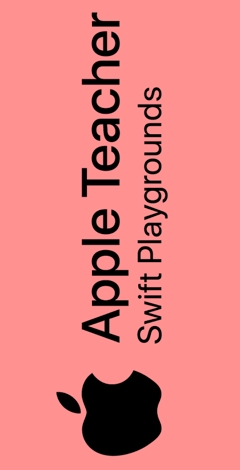ALERT! Windows BYOD Security update patching
As you would have seen in the media over the past two weeks, a major malware outbreak spread across the world affecting many Windows computers running versions XP, 7, 8 and 10. The WannaCrypt Ransomware can spread via computer networks and does not rely on a user opening an email attachment or visiting an affected website, making it particularly destructive.
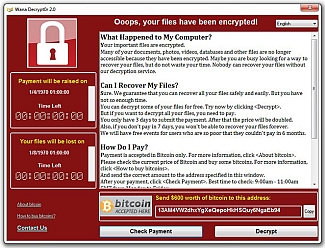
Once activated on a PC, it will automatically encrypt every user-created file and document it finds including Microsoft Word, Excel, PowerPoint, Adobe PDF and JPG format as well as dozens of other file types, rendering them inaccessible.
The WannaCrypt ransomware spreads via a security exploit that Microsoft released a security patch for in March of this year. All department-managed Windows computers (including eT4L and corporate) are protected via centrally-delivered patching and update services which have already deployed the necessary patch. However, there are concerns about Windows computers that are in schools and corporate offices that are unmanaged or are personally owned. (eg. BYODs).
ITD’s Information Security Unit has published urgent advice regarding the patching of unmanaged and BYOD Windows devices used in schools and corporate offices. Please pass on this information to all staff and students using unmanaged/BYOD Windows devices for urgent action.
G Suite at Mulwala Public
Sitting beside Lake Mulwala on our border with Victoria, Mulwala Public School is home to just 51 students. But like many small schools in NSW, they are taking full advantage of the technologies on offer to deliver collaborative learning across the school.
The school is a leader in the use of G Suite, with all students and staff proficiently using multiple apps to plan, create and share in ways that were impossible just a few years before.
Watch their G Suite story on Filmpond!
How secure is your DoE account password?
Your department staff account grants you access to your personal services including your staff portal, email, leave requests, Office 365 and G Suite. In addition, it links you to multiple corporate and student administration systems. This means that security of your staff account is very important, and that means keeping your password secure.
HOW TEACHERS MIGHT THINK PASSWORDS GET STOLEN
While all of these above methods are used around the world to "hack" user passwords, they require a level of technical skill and system access that is beyond general computer users. Instances of these methods have occurred in schools, but they are not common. The best defence for protecting against these methods is ensuring you use a strong password - having a password of at least 14 characters makes brute force cracking very difficult. All of the other methods above usually require direct access to local systems, ruling out internet-based hacks.
HOW TEACHER PASSWORDS MOST COMMONLY GET STOLEN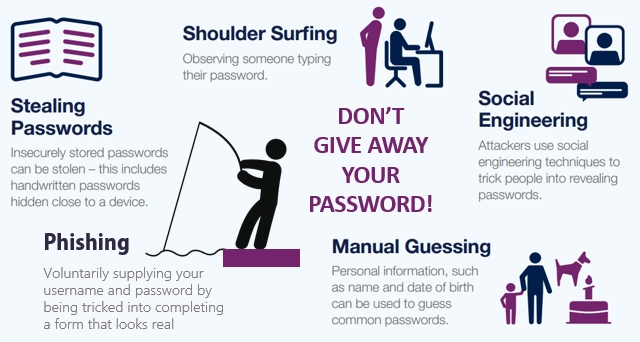
In the vast majority of cases, a teacher's password has become compromised not because of some technical wizard using complex password cracking tools, but because individuals have not been security-conscious or careful with their password. Walking away from a logged on computer is most common. At least lock the screen before leaving, or better, log off. Some have even purposely shared their passwords with their students in order to allow them access to YouTube or other sites normally blocked to younger students. As a result, their account details have appeared on on-line forums accessed by students and widely shared, allowing access to far more than just YouTube.
Share this article with all staff at your school. Help them understand the importance and purpose of their NSW DoE staff user account. Why not consider including account security as a topic on your next school development day? Take some time to talk about phishing, shoulder surfing, social engineering and strong passwords.
Get a free School Pond on Filmpond
Following the successful launch of school ponds in 2016, more than 400 schools are now proudly sharing their stories across NSW DoE and their local communities.
Your school pond is a safe, ad-free channel and has proven to be one of the most effective ways to share stories. If your school has not already done so, you can set up your school pond instantly and at no cost. This video explains how to set up your school pond.
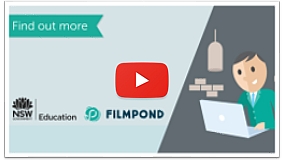
Making films in your Pond is also free!
If your story topics align with any of the thirteen Department of Education themes, making films in your school pond continues to be completely free in 2017! Department focus areas:
- Connected communities
- Curriculum implementation
- Literacy and numeracy
- RAM stories
- Tell them from me
- Technology for learning
- Future focused learning
- Beginning teacher support
- School leadership
- Student wellbeing
- Language and culture nests
- Engaging with your community
- Collaborative practice
You can also feature your films on the home page of your school website. Simply choose Filmpond on your Social Media Profile to automatically share films with your community. This option is available to schools using the DoE Schools Website Service.
Bega Valley PS and their Kinder webquest
Bega Valley Public School with its enrolment of 350, celebrates learning by preparing students to be critical problem solvers, creative thinkers and collaborative learners. Engagement in STEM-focused, problem-based learning challenges starts in Kindergarten.
Technology is used in innovative ways in the Kindergarten classroom, to provide students with modern learning skills that they can build on as they embark on their learning journey. A webquest was designed and run to support collaborative work with their peers and to use technology as a tool to learn about core content in science and technology.
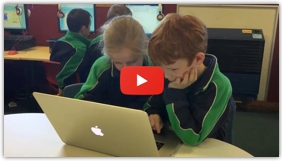
An engaging online platform enables the young learners to work with peers or independently, to develop identified knowledge, skills and capabilities. Students record and explain their thinking by collaboration and through the use of the site blog.
Work samples and assessment measures demonstrate positive student growth and high levels of engagement around science and technology. Students are showing success as effective communicators, collaborators and problem solvers. Watch their video and see other journeys at Futures Learning!
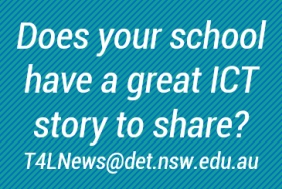

Building new HP Notebooks
We previously advised that the new 2017 models of HP notebooks are now available for discretionary purchase. As schools have been ordering and receiving these, some have been trying to deploy Windows 7 without success.
These new models are Windows 10 only, as advised at ITD's website. At this stage, the current model HP Desktop PC can still be built with Windows 7, but the next model will also be Windows 10 only.
Windows 10 in eT4L schools
Another milestone reached in the middle of May!
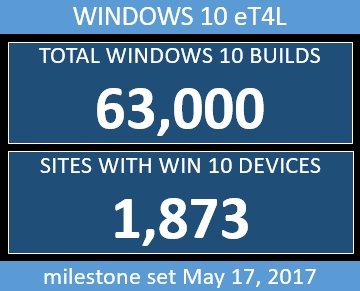
FREE Apple Teacher PL
Apple's Education team in Australia are hosting multiple free events for teachers on the North Coast of NSW. Apple's Everyone Can Code initiative is designed to help teach anyone how to code in the Swift programming language. Swift Playgrounds has a fun approach to learning Swift language with blocks of syntax code. Aimed at Grades 4-9 and includes teacher guides. BYO iPad with you.
Apple Teacher is a free professional learning program designed to support educators using Apple products for teaching and learning. This self-paced program allows you to earn badges along the way to becoming an Apple Teacher. Both are half-day events and you can choose to attend both events on the same day. For details and bookings:



